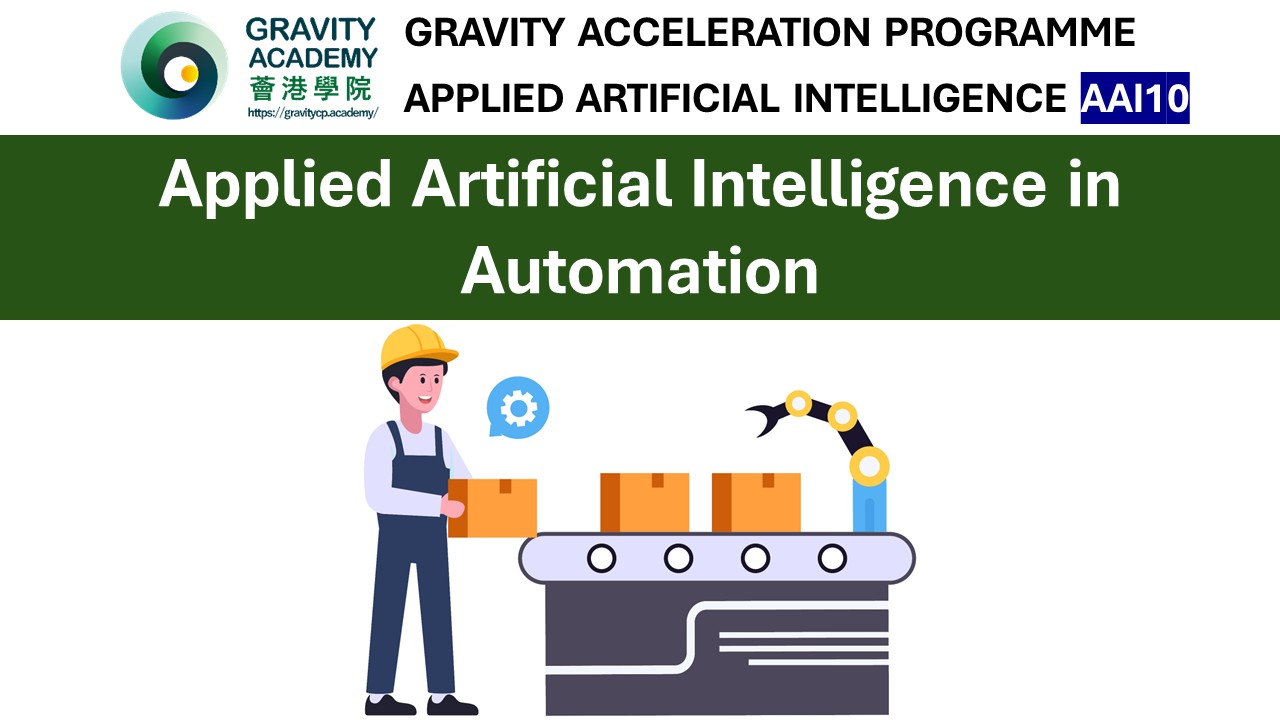AAIS10: Applied Artificial Intelligence in Automation

About Course
The “Applied Artificial Intelligence in Automation” course, meticulously led by Ir Prof Alan Lam at Gravity Academy, is tailored to explore the transformative impact of artificial intelligence (AI) on the automation industry. This course is designed to provide participants with a comprehensive understanding of how AI enhances and revolutionizes automation processes across various sectors, including manufacturing, logistics, and more.
Course Overview
This course is ideal for automation engineers, systems integrators, project managers, and anyone interested in leveraging AI technologies in automation. The curriculum covers a broad range of AI applications, from industrial automation and smart factories to autonomous vehicles and predictive maintenance.
The Curriculum
The curriculum is structured into twelve detailed modules, each focusing on a key aspect of AI applications in automation:
- The Role of AI in Industrial Automation: Overview of how AI technologies are integrated into industrial automation to enhance efficiency and productivity.
- AI-Driven Process Optimization: Techniques for using AI to optimize manufacturing processes, reduce waste, and increase throughput.
- Machine Vision Systems in Quality Control: Application of AI-powered machine vision systems to improve the accuracy and reliability of quality control processes.
- Predictive Maintenance through AI: Utilizing AI to predict equipment failures before they occur, minimizing downtime and maintenance costs.
- AI in Supply Chain and Logistics Automation: Enhancing supply chain efficiency with AI, from warehouse automation to dynamic routing of delivery vehicles.
- Smart Factories and Industry 4.0: Exploration of smart factories where AI integrates with IoT and big data to create fully automated, interconnected manufacturing environments.
- AI in Energy Management Systems: Application of AI to optimize energy usage in industrial settings, reducing operational costs and environmental impact.
- Natural Language Processing for Automation Tasks: Using NLP to facilitate human-machine interactions and automate complex tasks in industries such as customer service and document processing.
- Autonomous Systems in Agriculture: Implementing AI in agricultural automation, improving crop management through precision farming techniques.
- Challenges in AI-Powered Automation: Discussion of the technical, ethical, and operational challenges associated with integrating AI into existing automation systems.
- AI in Autonomous Vehicles and Drones: Overview of how AI is driving advancements in autonomous transportation, from self-driving cars to drone logistics.
- The Future of Workplace Automation: Insights into how AI will continue to transform workplaces, redefine roles, and create new opportunities in the automation sector.
The Instructor
Ir Prof Alan Lam is a leading expert in artificial intelligence applications in automation. His extensive experience and profound understanding of both AI and automation systems make him an ideal instructor to guide participants through this complex and rapidly evolving field.
Why Choose This Course
This course is crucial for participants who:
- Aim to understand the latest AI technologies and their applications in automation.
- Seek to implement AI-driven solutions to improve efficiency, reliability, and scalability in automation systems.
- Wish to stay competitive in a landscape that is increasingly dominated by smart automation solutions.
What Will You Obtain
Participants will receive:
- A certificate of completion from Gravity Academy, recognizing their capabilities in AI-driven automation.
- Practical skills in applying AI technologies to various automation challenges.
- Strategic insights into future developments in automation and how to prepare for these changes.
Suitable Candidate
This course is ideal for:
- Automation engineers and systems integrators looking to enhance their systems with AI capabilities.
- Project managers and industry professionals seeking to understand and implement AI in their operations.
- Innovators and entrepreneurs aiming to leverage AI in creating new solutions or improving existing products.
Student Ratings & Reviews
